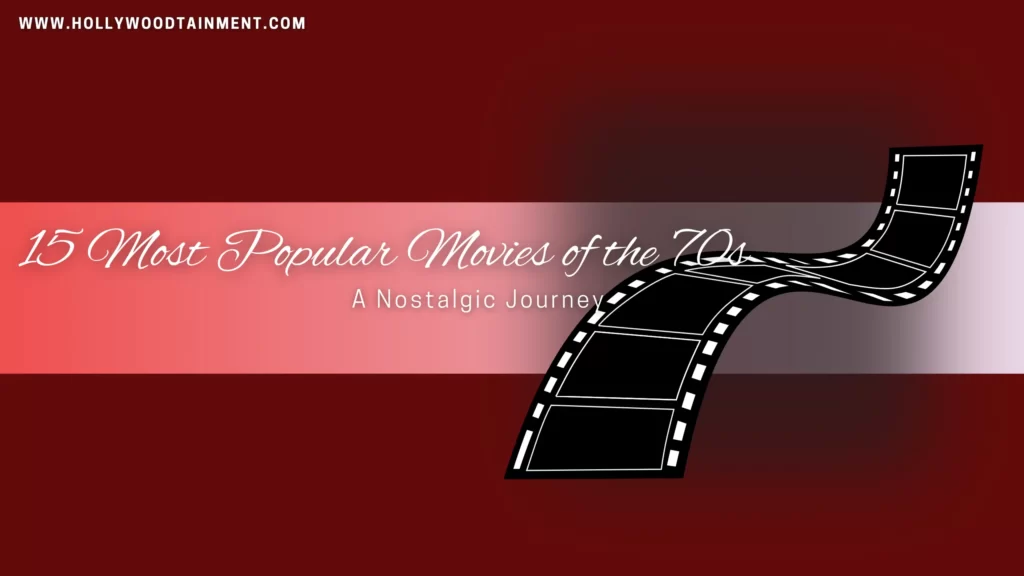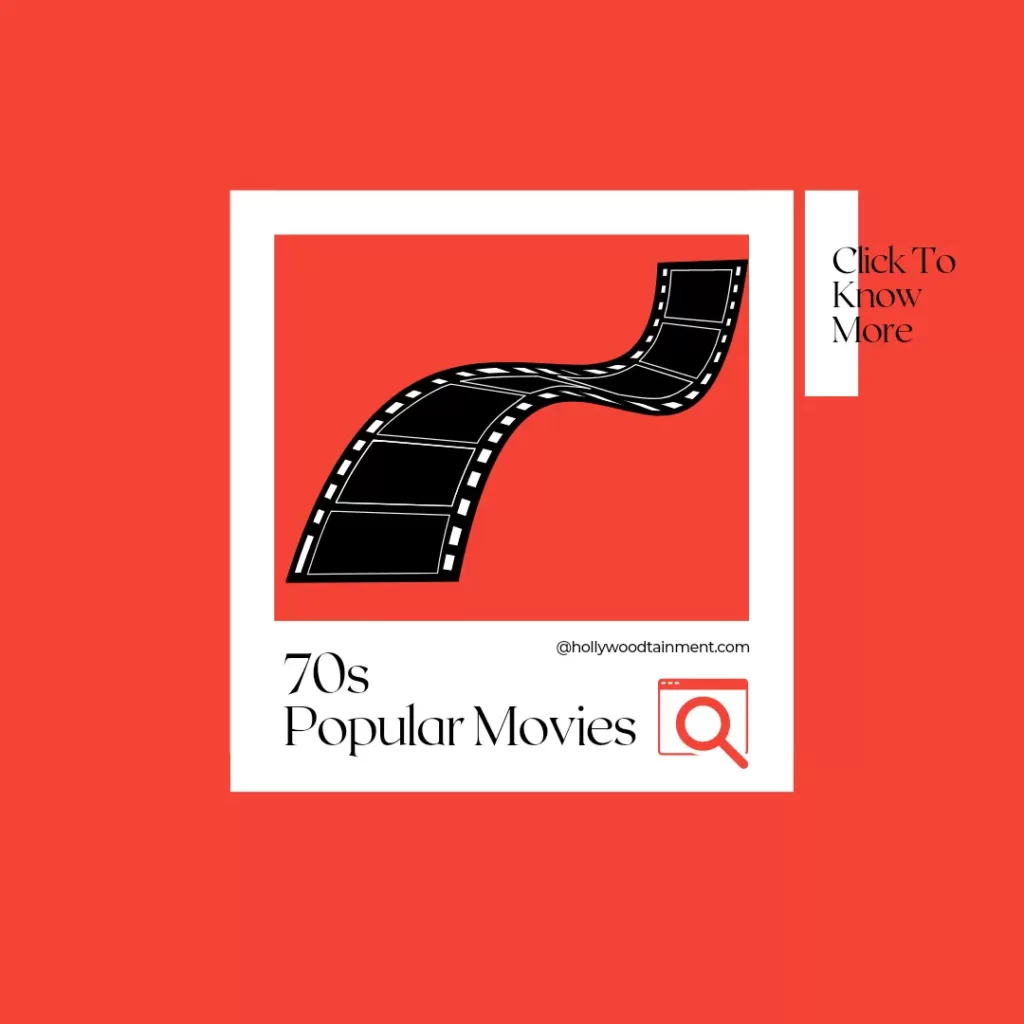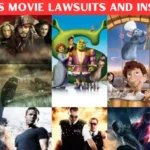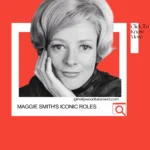Movies have an extraordinary power to transport us into different worlds, stir strong emotions, and leave an impactful mark on our lives. The 1970s was a decade that witnessed groundbreaking cinema, with numerous groundbreaking films becoming cultural icons. Here, we take a nostalgic journey back through time as we examine 15 most beloved 70s films, which continue to engage viewers even today.
Introduction
The 1970s marked an important period in filmmaking history as talented directors, innovative storytelling techniques, and cutting-edge visual effects appeared. During this period, they created many memorable movies that entertained and challenged societal norms and artistic boundaries. Let’s look back on some of these iconic 70s flicks that imprinted on cinema history. Here are 15 movies which left their mark.

The Godfather (1972): Redefining the Crime Genre
“The Godfather,” directed by Francis Ford Coppola and starring Marlon Brando, Al Pacino and James Caan, is an iconic crime drama that continues to be revered today as one of cinema’s greatest achievements. A timeless masterpiece in its genre with brilliant performances by these stars and iconic lines such as “I’ll make him an offer he can’t refuse”, this masterpiece remains one of cinema’s classic films.
Star Wars (1977): A Galactic Phenomenon
George Lucas’ “Star Wars,” released in 1977, sent audiences on an unforgettable journey into an endless galaxy. We met iconic characters such as Luke Skywalker, Princess Leia and Han Solo; its timeless story of good versus evil inspired many viewers and has become a global phenomenon ever since. Thanks to groundbreaking visual effects by Ray Harryhausen and John Williams’ score that continues to amaze audiences today, this timeless space opera remains beloved.
Jaws (1975): Unleashing Aquatic Terror
“Jaws,” directed by Steven Spielberg was released in 1975, brought terror and fear to the ocean. Based on Peter Benchley’s novel of the same name, this film depicts the attacks by a great white shark on an innocent coastal town and the subsequent responses by residents. With its iconic soundtrack and suspenseful storytelling techniques, “Jaws” became an instantaneous cultural icon that forever altered how many viewed marine environments while leaving an everlasting fear that has permeated society until today.
The Exorcist (1973): Chilling Horror at Its Finest
William Friedkin’s The Exorcist (1973) is a scary horror movie that explores supernatural themes. Based on William Peter Blatty’s novel follows a young girl’s possession by demons. It attempts to free her soul and explore faith versus evil themes in filmmaking, providing shocking imagery, intense performances, and groundbreaking filmmaking techniques that set new benchmarks within the horror genre.
Rocky (1976): A Triumph of the Underdog
Rocky (1976) by Sylvester Stallone is an inspirational sports drama depicting Rocky Balboa, an underdog boxer who gets his chance at the heavyweight championship only once. As audiences followed Rocky through his journey of determination, resilience and love on his path towards glory, “Rocky” quickly became a worldwide classic – its unforgettable training montages and memorable theme song remain beloved classics today.
One Flew Over the Cuckoo’s Nest (1975): A Profound Exploration of Sanity
“One Flew Over the Cuckoo’s Nest,” based on Ken Kesey’s novel, is an unforgettable drama directed by Milos Forman that examines the boundaries between sanity and conformity—starring Jack Nicholson as an unconventional rebel leading change at an institution for people with a mental health condition. A thought-provoking examination of individuality, oppression, and the human spirit – it won five Academy Awards – including Best Picture!
Taxi Driver (1976): Scorsese’s Dark Masterpiece
Martin Scorsese’s “Taxi Driver” delves deep into the seedy side of New York City. Starring Robert De Niro as Travis Bickle, an outcast taxi driver descending into madness, “Taxi Driver” explores themes of isolation, alienation and urban decay through its gritty atmosphere, intense character studies and De Niro’s unforgettable performance as Travis Bickle – remaining a cinematic masterpiece and testament to Scorsese’s brilliant directorial skills.
A Clockwork Orange (1971): Provocative and Controversial
Stanley Kubrick’s 1971 adaptation of Anthony Burgess’s novel, A Clockwork Orange is an unsettling and thought-provoking film experience, taking viewers on an exploration of free will, morality, and the consequences of social control – creating an unnerving yet thought-provoking cinematic journey that challenges audiences’ perceptions.
The French Connection (1971): Gritty Realism and Intense Action
William Friedkin’s crime thriller The French Connection (1971) is an intense crime drama inspired by true events and stars Gene Hackman as Detective Jimmy “Popeye” Doyle of the New York Police Department’s drug enforcement unit. Boasting realistic police work scenes, thrilling car chases, and an overall gritty atmosphere, “The French Connection” earned critical acclaim and five Academy Awards – including Best Picture!
Apocalypse Now (1979): The Madness of War
“Apocalypse Now” (1979) by Francis Ford Coppola transports viewers deep into the chaos and horrors of the Vietnam War. Starring Martin Sheen as Captain Willard on an important mission to assassinate a renegade colonel, “Apocalypse Now” explores the madness of war through stunning cinematography and stellar performances by Marlon Brando and Robert Duvall – making for an enduring depiction of human emotions during times of turmoil.
Annie Hall (1977): Woody Allen’s Witty Rom-Com
Annie Hall (1977), directed by Woody Allen, is an offbeat yet unconventional romantic comedy. Allen stars as Alvy Singer, a neurotic comedian contemplating his failed relationships, specifically those with Annie Hall, portrayed by Diane Keaton. With its inventive storytelling, smart dialogue, and unique blend of humour and introspection, it earned critical acclaim and won four Academy Awards (including Best Picture ).
Saturday Night Fever (1977): Disco Fever Hits the Big Screen
“Saturday Night Fever” captured the disco fever of the 70s, featuring John Travolta as Tony Manero – an ambitious young man looking for an escape route from working-class life through dancing talent. Set against the vibrant disco scene, “Saturday Night Fever” explores identity issues such as friendship and searching for meaning through electrifying dance sequences and an iconic soundtrack, becoming both a cultural phenomenon and an iconic symbol of its time.
Close Encounters of the Third Kind (1977): Spielberg’s Extraterrestrial Wonder
Steven Spielberg’s 1977 classic “Close Encounters of the Third Kind” takes us on an incredible voyage through extraterrestrial contact. Starring Richard Dreyfuss as Roy Neary, this gripping journey features great visual effects, stirring music and Spielberg’s brilliant storytelling to explore our fascination with what lies beyond our familiar realm. “Close Encounters of the Third Kind” remains an engaging yet thought-provoking exploration of humanity’s fascination with what remains unknown.
The Texas Chain Saw Massacre (1974): A Terrifying Cult Classic
“The Texas Chain Saw Massacre”, directed by Tobe Hooper in 1974, is an innovative horror movie that stunned audiences with its raw and visceral depiction of terror. Based on real events, this tale follows a group of friends as they encounter cannibals in Texas’ desolate countryside and become victims themselves. Due to its relentless intensity, iconic villain Leatherface, and gritty atmosphere, “The Texas Chain Saw Massacre” became an instant cult classic that continues to haunt and disturb audiences worldwide today.
The Godfather Part II (1974)
“The Godfather Part II” serves both as a prequel and sequel to its predecessor. It delves deeper into the origins of Vito Corleone, with Robert De Niro portraying young Vito’s rise to power before simultaneously following Michael as Don despite internal and external threats threatening his empire. Thus the sequel offers an in-depth examination of Corleone family decisions as well as their consequences.
You can watch Your Favourite one here
You can also scroll through the other content and don’t forget to subscribe.
Conclusion
The 1970s was an iconic decade in cinema history, producing films that have become timeless classics. These 15 movies from this decade represent its creativity, innovation and cultural impact: crime dramas and epic sagas alike, as well as thought-provoking dramas and terrifying horror flicks, continue to engage audiences with compelling tales, unforgettable performances and lasting influence in cinema today.
What criteria were used to gauge these movies’ popularity?
Their fame was determined using factors like box office success, critical acclaim, cultural impact and continued relevance in popular culture.
Are There Any Honorable Mentions Not on This List?
While this list primarily highlights 15 popular movies from the 70s, other notable films from that era deserve honorable mention. Some such honorable mentions include Alien (1979), Chinatown (1974), The Deer Hunter (1978) and Network (1976).
Do all these movies achieve critical acclaim as well?
In most cases, yes. These films won significant critical acclaim and earned numerous accolades including Academy Awards nominations or positive reviews from film critics.
How have these films influenced modern cinema?
These movies have had an immense influence on modern cinema through storytelling techniques, visual effects, character development and thematic exploration. Many contemporary filmmakers draw inspiration from them and honor their groundbreaking contributions by paying homage.
Where can I watch these movies today?
Most of these movies can be found online streaming platforms such as Netflix, Amazon Prime Video and Hulu; additionally they may also be purchased as DVD or Blu-ray media and even shown at film festivals and theaters.
You can also check out other content







